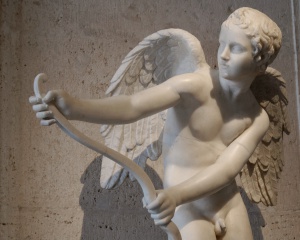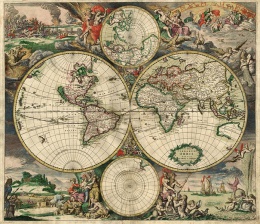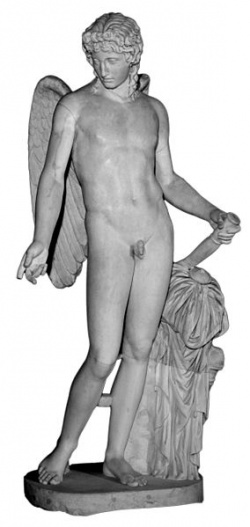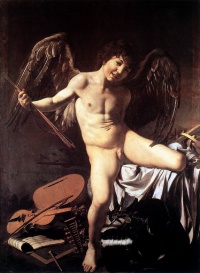Eros (mythology): Difference between revisions
Moved the page from the "Mythology" category to the "Greek mythology" category |
Added an image to the article |
||
| (One intermediate revision by the same user not shown) | |||
| Line 1: | Line 1: | ||
[[File:Eros bow Musei Capitolini MC410 n4.jpg|300px|thumb|right|Eros Stringing His Bow (detail). Roman marble copy of the 2nd century AD after a Greek original of the 4th century BC by Lysippos. Rome, Musei Capitolini, Palazzo Nuovo.]] | |||
{{History}} | {{History}} | ||
In Greek mythology, '''Eros''' was the primordial god responsible for lust, love, and sex; he was also worshipped as a fertility deity. His name is the root of words such as erotic. His [[Ancient Rome|Roman]] equivalent was Cupid, "desire", also known as Amor, "love". He was often associated with Aphrodite. Like [[Dionysus]], he was sometimes referred to as Eleutherios, "the liberator". | In Greek mythology, '''Eros''' was the primordial god responsible for lust, love, and sex; he was also worshipped as a fertility deity. His name is the root of words such as erotic. His [[Ancient Rome|Roman]] equivalent was Cupid, "desire", also known as Amor, "love". He was often associated with Aphrodite. Like [[Dionysus]], he was sometimes referred to as Eleutherios, "the liberator". | ||
| Line 55: | Line 57: | ||
[[Category:Greek mythology]] | [[Category:Greek mythology]] | ||
[[Category:Roman mythology]] | |||
Latest revision as of 05:07, 25 September 2021

| Part of the boylove history series |
 |
| Portal:History |
In Greek mythology, Eros was the primordial god responsible for lust, love, and sex; he was also worshipped as a fertility deity. His name is the root of words such as erotic. His Roman equivalent was Cupid, "desire", also known as Amor, "love". He was often associated with Aphrodite. Like Dionysus, he was sometimes referred to as Eleutherios, "the liberator".
According to tradition, Eros was principally the patron of male love, while Aphrodite ruled mens' love of women. Thus his statue could be found in the palaestras, one of the principal venues for men to associate with their beloveds, and it was to him that the Spartans sacrificed before battle. Meleager records this role in a poem preserved in the Greek Anthology: "The Cyprian queen, a woman, hurls the fire that maddens men for females; but Erôs himself sways the love of males for males." (Mousa Paidiké, 86)
Worship

Throughout Greek thought, there appear to be two sides to the conception of Eros; in the first, he is a primeval deity who embodies not only the force of erotic love but also the creative urge of ever-flowing nature, the first-born Light that is responsible for the coming into being and ordering of all things in the cosmos. In Hesiod's Theogony, the most famous Greek creation myth, Eros sprang forth from the primordial Chaos together with Gaia, the Earth, and Tartarus, the underworld; according to Aristophanes' play The Birds, he burgeons forth from an egg laid by Night conceived with Darkness. In the Eleusinian Mysteries, he was worshipped as Protogonus, the first-born.
In art, Eros was usually depicted as a nude winged boy or infant (although this is associated more with Cupid from Roman religion; to the Greeks he was a young man or a teenager), with his bow and arrows in hand. He had two kinds of arrows: one was golden with dove feathers that caused instant love; the other was lead with owl feathers that caused indifference.[1] The poet Sappho described him as "bittersweet" and "cruel" to his victims; he was also unscrupulous, mischievous and charismatic. In his ancient identification with Protogones and Phanes he was adorned represented as a bull, a serpent, a lion, and with the heads of a ram. He is occasionally shown blind or blindfolded.
Worship of Eros was uncommon in early Greece, but eventually became widespread. He was fervently worshipped by a fertility cult in Thespiae, and played an important role in the Eleusinian Mysteries. In Athens, he shared a very popular cult with Aphrodite, and the fourth day of every month was sacred to him.
Mythology

1st c. BCE marble from Pompeii.
In later Antiquity, Eros was the son of Aphrodite and either Ares or Hephaestus, or of Porus and Penia, or sometimes of Iris and Zephyrus; this Eros was an attendant to Aphrodite, harnessing the primordial force of love and directing it into mortals, an apt role for the issue of a union between "Love" and either "War" or "Fire." In some myths, he is portrayed as being playful, frequently causing trouble for gods and mortals; in others, he is mindful of the power he wields, sometimes refusing the entreaties of his mother and other gods to interfere in the course of some mortals' lives. In some versions he had brothers named Anteros, the embodiment of unrequited love, and Himerus.
Eros, angry at Apollo for making fun of his archery skills, caused him to fall in love with the nymph Daphne, daughter of Ladon, who had scorned him. Daphne prayed to the river god Peneus to help her and was changed into a laurel tree, which became sacred to Apollo.
The story of Cupid and Psyche has a longstanding tradition as a folktale of the ancient Greco-Roman world long before it was put to print; first seen Apuleius' Latin novel, The Golden Ass, this is apparent and an interesting intermingling of character roles. The novel itself is picaresque Roman style, yet Psyche and Aphrodite retain their Greek parts. It is only Cupid whose role hails from his part in the Roman pantheon.
The story it is told as a digression and structural parallel to the main storyline of Apuleius' novel. It tells of the struggle for love and trust between Cupid and Psyche, whose name is difficult to appropriately translate as it transcends both the Greek and Latin language, but can be taken to mean "soul", "mind" or rather both. Aphrodite was jealous of the beauty of mortal Psyche, as men were leaving her altars barren to worship a mere human woman instead, and so commands her son Cupid to cause Psyche to fall in love with the ugliest creature on earth. Cupid falls in love with Psyche himself and spirits her away to his home. Their fragile peace is ruined by a visit of Psyche's jealous sisters who cause Psyche to betray the trust of her husband. Wounded, Cupid departs his wife and Psyche wanders the earth, looking for her lost love. In order to regain the trust and love that she cast away, Psyche must complete three tasks, one requiring descent to the underworld. By embracing the help of nature, she is successful and is received into the pantheon of gods as an immortal and reconciles with her mother-in-law. Eventually, she bears Cupid a daughter, Voluptas, whose name means "pleasure." Psyche's visit to and return from the underworld made her an object of some devotion, like Dionysus and Persephone. She was an object of some mystery religions and was occasionally mentioned in connection with the popular Eleusinian Mysteries.
Some people believe that this story tells of how love can come from when desire (Eros) starts to fancy a person's soul (Psyche) rather than their body. The two find love, but easily lose it because of mistrust.
Love Conquers All

Early in his career, Caravaggio had challenged contemporary sensibilities with his "sexually provocative and anti-intellectual" Victorious Love, also known as Love Conquers All (Amor Vincit Omnia), in which a brazenly naked Eros/Cupid tramples on emblems of culture and erudition representing music, architecture, warfare, and scholarship.[2]
The motto comes from the Augustan poet Vergil, writing in the late 1st century BC. His collection of Eclogues concludes with what might be his most famous line:[3]
Omnia vincit Amor: et nos cedamus Amori.
Love conquers all, and so let us surrender ourselves to Love.[4]
The theme of Love Conquers All is consistent with the deeds of Harmodius and Aristogeiton, where it is said that the courage and loyalty shown by the lovers in resisting tyranny was believed to be a specific attribute of pederasty.
References
Notes
- Bartsch, Shadi and Thomas Bartscherer, eds. Erotikon: Essays on Eros, Ancient and Modern. Chicago: University of Chicago Press, 2005.
- Bataille, George. The Tears of Eros. Translated by Peter Connor. San Francisco: City Lights Books, 1989.
- Calame, Claude. The Poetics of Eros in Ancient Greece. Translated by Janet Lloyd. Princeton: Princeton University Press, 1999.
- Carson, Anne. Eros the Bittersweet: An Essay. Princeton, N.J.: Princeton University Press, 1986.
- Nygren, Anders. Agape and Eros. Translated by Philip S. Watson. New York: Harper and Row, 1969.
See also
External links
- Original source of this entry:Eros (mythology)